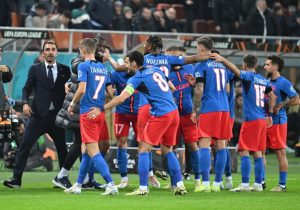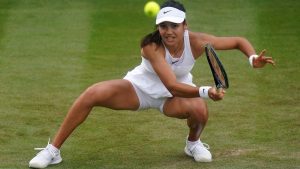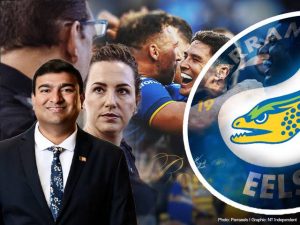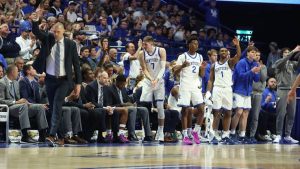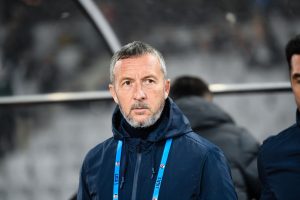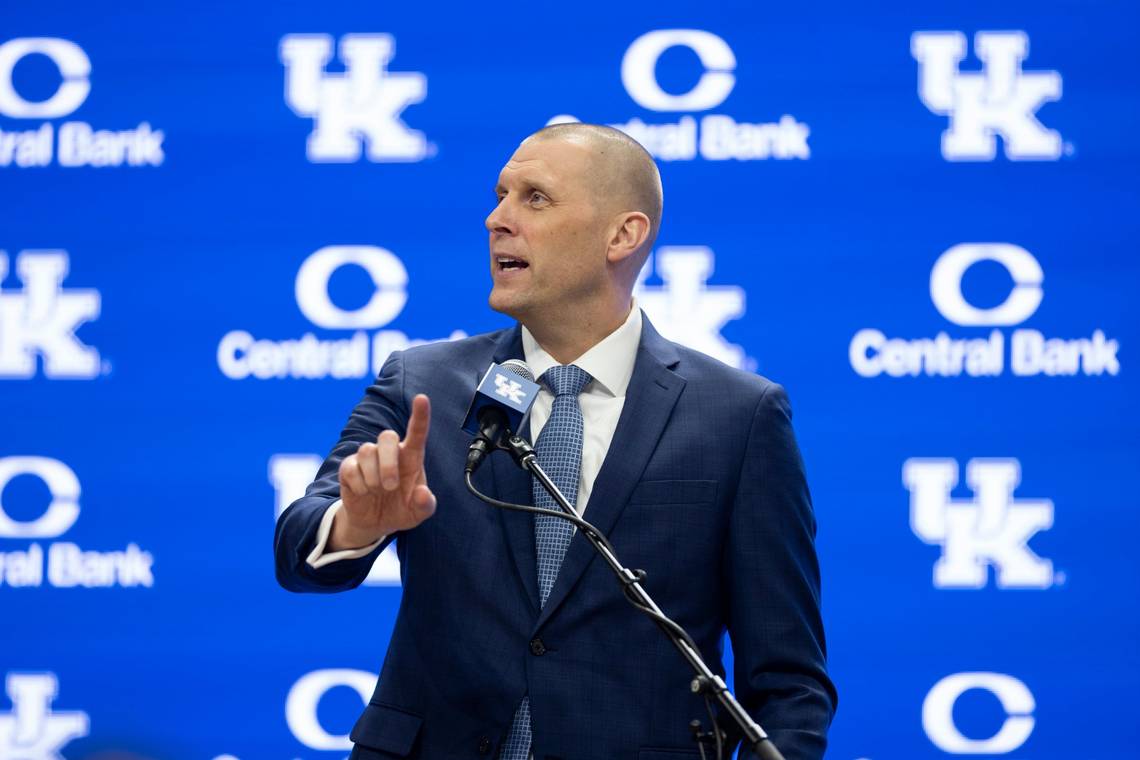
Hard questions about John Calipari’s future at Kentucky are now unavoidable after Oakland upset

PITTSBURGH — The question Kentucky athletic director Mitch Barnhart must now answer is as simple as it is complicated: What is the price of the program’s dignity? What’s it worth to expel a Hall of Fame coach who can neither recapture the magic nor ever offer even a coherent theory as to why? What would the Wildcats be willing to pay for, say, more than one NCAA Tournament victory in the last four years? And is the obscene $33 million buyout in John Calipari’s albatross of a “lifetime” contract too much?
Hard questions, previously unfathomable questions, have to be asked after Calipari’s latest postseason stunner, an 80-76 loss in the South Region to 14th-seeded Oakland, which had never won a game in the NCAA Tournament. The particulars hardly matter, but a former Division II player coming off the bench to bury 10 3-pointers and score 32 points against No. 3 seed Kentucky only adds insult to incompetence. Calipari just took the most talented, most exciting, most beloved roster he’s had in years and failed to win a single postseason game with it. Not an SEC tournament game. Not an NCAA Tournament game.
In the end, not a single game that matters. Calipari had the national freshman of the year, Reed Sheppard, who was genetically engineered to bring Kentucky fans maximum joy, and squandered what might well be his only season in Lexington. Calipari had a fifth-year senior, Antonio Reeves, who scored more points than any player he’s ever coached at Kentucky — including 27 more on Thursday night just to give the Cats a chance — and wasted it. He had Rob Dillingham, the most sensational microwave scorer in the country, and lost 10 freaking games.
“Everyone loved watching this team, and I loved playing for this team,” Sheppard said after the game, between sobs, “and it sucks it’s over.”
Former national player of the year Oscar Tshiebwe looked and sounded almost exactly the same, utterly shocked and devastated, after the previous two March meltdowns under Calipari, who took the most dominant rebounder in modern college basketball history and won one SEC tournament game and one NCAA Tournament game and lost to No. 15 seed Saint Peter’s in 2022. There was a time when it seemed absurd to say Calipari underachieved with the hordes of talent he’d enjoyed at Kentucky, because back then “underachieving” meant going to seven Elite Eights and four Final Fours in his first 10 seasons but only having the one national championship.
What he wouldn’t give for that to be his current definition of failure. He’s gone four years without an SEC title and this year, he turned a No. 1 recruiting class and the best 3-point-shooting team in program history into the second-most humiliating NCAA Tournament loss this blue blood has ever suffered.
“We wanted to go far,” Dillingham said, “but we just didn’t take advantage of the moment. We weren’t ready for it. I feel like we got the deepest team in a long time. Every single player, every single position, we can all dribble, pass and shoot. It’s good to say it, but we should’ve pulled through. We definitely should’ve gone deeper.”
Deeper implies any depth at all. Zero postseason victories with a team overflowing with offensive talent. But they couldn’t defend a fence post — or a guy who came in with the most made 3s of any player in the tournament and only eight 2-point tries all season, who clearly wanted to shoot from one sweet spot on the floor Thursday night. Kentucky frequently obliged. This was the fiery crash everyone saw coming. Except Calipari, apparently.
“This one, I’m really hurting for them, because other years you max out and you lose a game and you’re like, ‘Geez,’” Calipari said. “(But) this team, I really felt, could have done so much more. I just thought I had a team that could do some stuff.”
He did have that team. He did very little stuff with them. Wins over North Carolina, Tennessee, Auburn and Alabama, all top-four seeds in this NCAA Tournament, were ultimately little more than taunting teases. This is what could be, but won’t.
Unacceptable results aren’t the only reason it’s time to think seriously about parting ways with the 65-year-old Calipari. His inability to accept responsibility for the failures — or identify their cause — is in some ways even worse. What went wrong this time?
“We made some critical mistakes at critical times again today,” Calipari said, “and when you have a really young team and you look at where did the mistakes come from, they were freshmen.”
Hogwash. Calipari made a clear and defiant choice in the face of an obvious shift in college basketball. Everyone else went super old, and Calipari went as young as ever. He played five freshmen together at times this season. And not by accident.
“If you ask me talent or experience, I’m taking talent,” a chest-puffing Calipari said at the team’s media day in October, “and the talent usually figures it out.”
Only it didn’t. Calipari also had his oldest roster ever in 2022 and flopped in the first round. The players change every season in Lexington. The staff has turned over a ton in the last four years. The common denominator is the program’s $9 million-a-year man. Maybe he could shoulder a smidge of the blame?
Asked what he might’ve done to help those players Thursday night, Calipari cited a timeout he should’ve called sooner. Maybe gone to the box-and-one defense a little earlier, he said.
“But in hindsight when you’re coaching, if you did something and we had won this game, you’re a genius — and if you don’t do it, you know, you’re the bad guy,” he said. “Like I said, I thought the preparation was what it needed to be.”
That’s highly debatable. And it ignores any possibility that mistakes were made at the top. Which brings us to the other burning question: If Kentucky can’t or won’t pay the buyout, if Calipari returns for a 16th season, what then? What, if anything, would be different? A stone-faced Barnhart declined an interview request after the game.
Late Thursday night, Calipari said the thing nobody in Kentucky’s fed-up fan base wants to hear right now, that “we’ve got an unbelievable group coming in,” more five-star freshmen, the nation’s No. 2-ranked recruiting class. As if he’s learned nothing at all.
He was asked whether the recent postseason failures will impact his philosophy on building rosters.
“It’s a good question,” Calipari said. “I’ve done this with young teams my whole career, and it’s going to be hard for me to change that, because we’ve helped so many young people and their families that I don’t see myself just saying, OK, we’re not going to recruit freshmen.”
He did acknowledge the game has “changed on us; all of a sudden it’s gotten really old,” although that shift hasn’t been sudden at all. “Maybe add a couple older guys to supplement,” Calipari said. But also, “we may not need it.”
Maybe not if a few of these incredibly talented freshmen actually came back for a change. If somehow Sheppard and others returned for a sophomore season. The chances of that seem slim, but if there’s any hope for Calipari salvaging something from the wreckage of this season, that’s it.
And say this for the man: His players love him, believe in him, defend him. They’re among a rapidly shrinking number who would even try.
“None of that’s on Coach,” Sheppard said, sobbing again. “Coach isn’t out there playing the game. He’s not out there shooting the shots. He’s not out there guarding. He’s not out there doing anything. They prepared us for the game and we didn’t — we couldn’t — stop them. None of this is on any of the coaches, I don’t care what anybody says. We have the best coach in the world.”
But now the question Barnhart has to ask himself is how many other coaches might’ve done more with less than Calipari has been given, and what it might be worth to find out.

